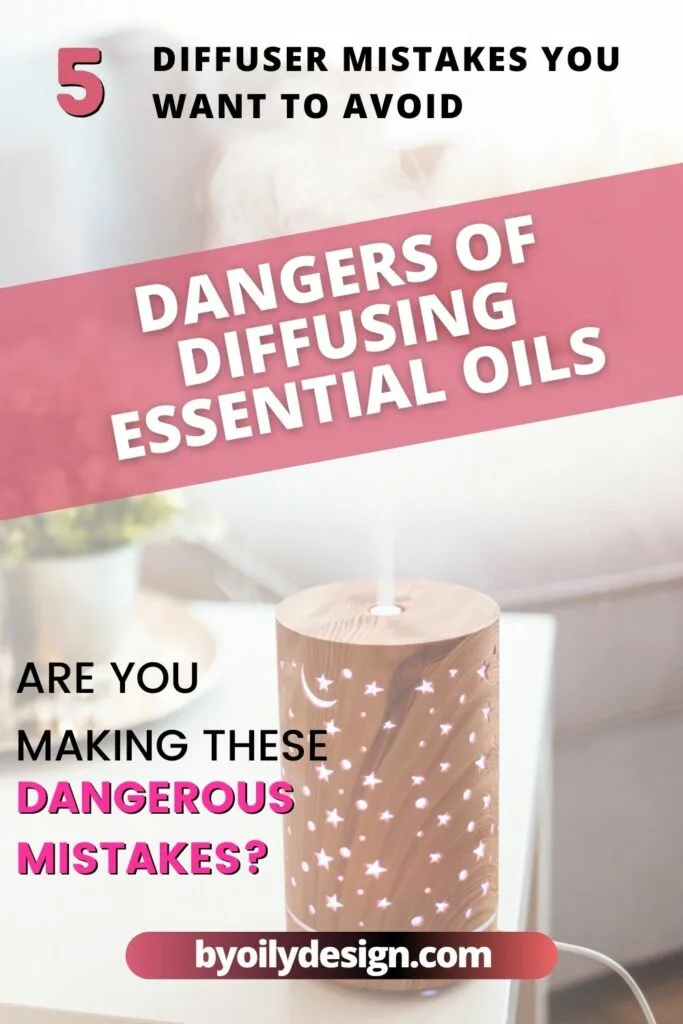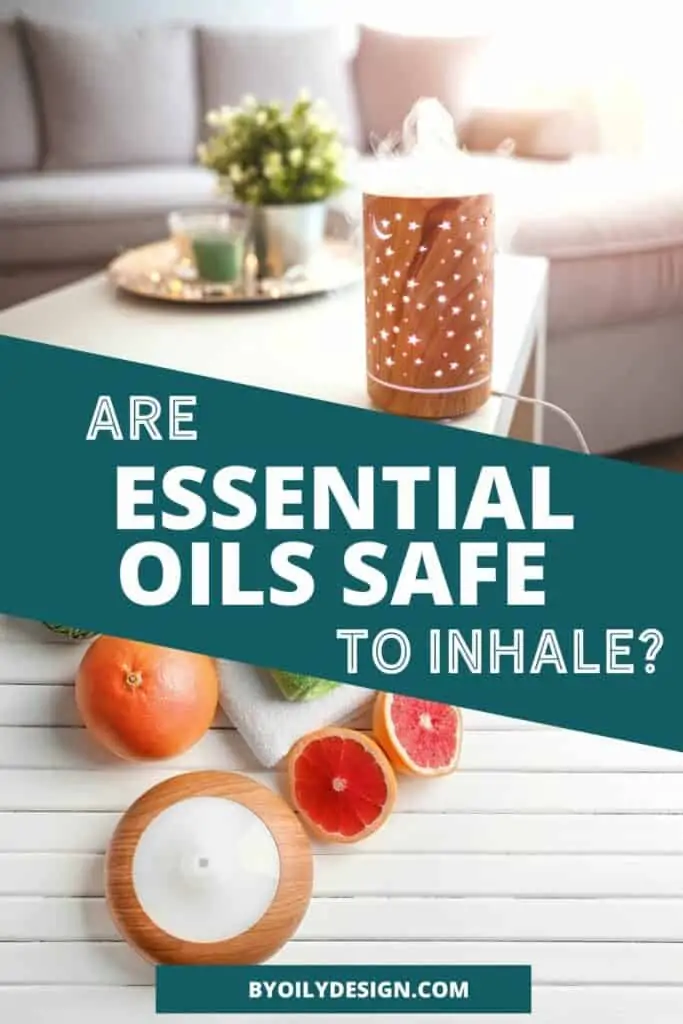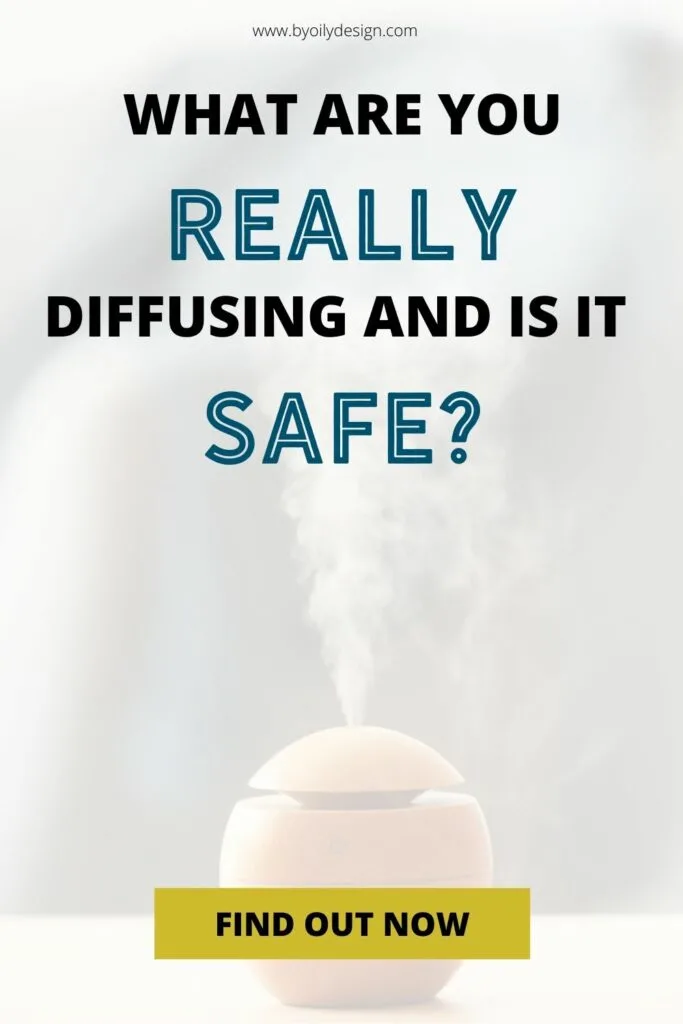Dangers of essential oil diffusers
As the popularity of essential oils continues to grow, so do the concerns about their safety. If you have recently bought an essential oil diffuser, you may be concerned about the dangers of essential oil diffusers. Whether you have purchased an essential oil diffuser to make your home smell good or gain the various health benefits of diffusing essential oils, it is necessary to know how to safely use essential oil diffusers.
In this post, we will cover various topics, including –
- Are essential oil diffusers harmful?
- Essential oil diffuser mistakes to avoid?
- Essential oil diffuser safety tips to follow
*This post contains affiliate links to the essential oils and other products I talk about in the post. Purchasing from the links here on my blog is no extra cost to you. As an Amazon Associate, I earn from qualifying purchases.
Are essential oil diffusers harmful?
People generally assume that diffusing essential oils is safe as essential oils are natural and pure. However, there are dangers of essential oil diffusers that most don't realize.
Generally, when essential oils are diffused into the air in a well-ventilated space and inhaled, they are safe. However, some people may find diffusing essential oils irritating to their airways. It is important to use essential oils in accordance with the product guidelines.
Here are some common safety concerns for oil diffusers –
1. Device malfunction
There is a chance that your diffuser may malfunction. The user could also get burnt due to incorrect handling of the device. It is vital to avoid diffusers that use open flame for safety reasons. This is why cleaning your diffuser after each use to prevent oil build is important.
2. Microbes in diffusers
Ultrasonic diffusers have a water reservoir which you must clean adequately. If you do not clean the diffusers properly, it can lead to the growth of microbes, which may cause infections.
3. Asthma attacks
Inhaling essential oils that are diffused is safe for most people. However, some people may react to the fumes and get an asthma attack. Breathing in essential oils can cause a severe lung infection known as pneumonitis in some people.
4. Headaches
Inhaling too much essential oil can cause headaches in some people.
5. Toxicity
Inhaling too much essential oil can lead to toxicity in young children and pets. Inhaling certain essential oils can also be harmful to pregnant women and their babies.

5 Essential oil diffuser mistakes to avoid
Many people ask, are essential oil diffusers good for you? Essential oils can be highly beneficial if used correctly. Essential oils are highly concentrated liquids, and you must use them properly in the diffusers. Here are some of the common mistakes that people make while diffusing essential oils and ways to correct them –
1. Diffusing essential oils for too long
When we diffuse essential oils in any room for a long time, our nose receives a constant stream of the same molecules. This leads to olfactory fatigue in the odor receptors. The odor receptors stop sending messages to the brain about this odor and focus on new smells. Though olfactory fatigue is good as it prevents the nervous system from being overloaded, it also means that diffusing continuously does not increase the benefits that you will be receiving from the essential oils.
To avoid olfactory fatigue, use your diffuser for a short period. You should ideally diffuse for 15 minutes at a time. Essential oil overdose symptoms also include headaches and allergic reactions.
2. Using diffuser through the night
People often ask – Can you sleep with a diffuser on? When people read that essential oils like lavender, marjoram and frankincense are excellent sleep aids; they assume that they should diffuse them through the night while they sleep. You may not get as many benefits from these oils as you think if you diffuse them through the night.
When you sleep during the night, your body focuses on resting and repairing muscles, organs and cells. Your brain becomes less responsive and does not focus on inhaling odor molecules. Essential oils diffused this time may not be of much use. Instead, to gain the best benefits of sleep-aid essential oils, use them in your diffuser 30 minutes before you sleep.
3. Using too much essential oil in the diffuser
When it comes to diffusing essential oils, less is more. The most common mistake people make while diffusing essential oils is using too much oil. Using more essential oil does not mean it will have a higher impact. The concentration at which the human nose can detect an odor can vary depending on your age, genetics, and the room's size.
Whether you can smell the essential oil being diffused or not, you are inhaling the molecules and getting the benefits. So, you must follow the diffuser brand recommendations and not follow your sense of smell. As a general rule, it's a good idea not to add more than five to six drops of essential oil to your diffuser at a time.
3. Diffusing essential oils around pets
Pet owners need to understand the toxic effects diffusing essential oils around pets can have. Dogs and cats are much more sensitive to smells than humans. What you think is a pleasant scent may be overwhelming for your pet.
Cats do not have the enzymes that can process compounds called phenols found in essential oils. Phenolic compounds can lead to liver failure in cats. Cat owners should be aware that Cinnamon oil, Citrus oils, Clove oil, Eucalyptus oil, Oil of Sweet Birch, Pennyroyal oil, Peppermint oil, Pine oils, Tea Tree oil, Wintergreen, and Ylang Ylang oil are poisonous to cats.
Incorrect usage of essential oils can also lead to respiratory problems, nervous system effects, and behavior changes in dogs.
When diffusing essential oils around your pets, always leave a door or window open so that your pet can leave the room when they find the scent overwhelming.
If you worry about how your pet is reacting to essential oils you can call the Pet poison helpline.
5. Diffusing essential oils around pregnant women
Generally, diffusing essential oils is a safer option than using them topically when it comes to pregnant women. However, if you ask me are essential oil safe to inhale during the first trimester, I would have to say no. You must avoid using essential oil during the first trimester. This is the most critical period during pregnancy, and you must avoid exposing the fetus to a concentrated substance.
You can diffuse essential oils around pregnant women during the second and the third trimester, but you must do so safely. Diffuse just two or three drops and do not diffuse for more than 15 minutes. Many hospitals now encourage the diffusion of lavender and other oils during labor after scientific evidence showed them the benefits for diffusing lavender during labor.
Is diffusing essential oils safe for your lungs?
If you don’t have any existing lung issues, it is safe to diffuse a few essential oil drops for a limited amount of time. Diffusing essential oil won't put you at risk unless you have allergies.
However, if you have a lung condition like asthma or chronic obstructive pulmonary disease, you should be more cautious. Breathing in the tiny particles released by the diffuser can actually trigger airway inflammation and asthma symptoms. Essential oils like eucalyptus and lavender are known to release terpene, toluene, and benzene, which can cause difficulty breathing. Terpene can cause respiratory distress side effects like shortness of breath, chest tightness, and wheezing.
Anytime you are in respiratory distress, first, seek fresh air away from the essential oils and then seek medical care immediately.
Are essential oils carcinogenic?
A carcinogen is a substance that may give rise to tumor production. Some essential oils may contain substances that can cause cancer. These include estragole, asarone, safrole, and methyl eugenol.
Some essential oils that contain these carcinogens are considered carcinogenic, but others are not. It depends on the constituent's concentration, the constituent's potency, and the amount of anti-carcinogenic components in that oil.
Rose oil, Elemi oil, and Holy Basil oil all contain minimal amounts of carcinogens, but these oils are not considered carcinogenic. On the other hand, Calamus oil, Sassafras oil, and Huon Pine oil are considered carcinogenic, and they are not used in aromatherapy.

Essential oil Safety
Here are some tips for diffusing essential oils safely in your home –
1. Buy good quality essential oils
Buying good quality essential oils from a reputable source like Young Living and using them in your diffuser will ensure that your diffuser runs safely and efficiently.
2. Follow the diffuser instructions
You must follow the instructions that come with your diffuser. This will ensure that your diffuser runs smoothly, and you will be able to avoid any mishaps.
3. Use the right amount of oil
Using too much oil can leave you with an overpowering smell that can lead to headaches and respiratory irritation.
4. Look out for signs of an allergic reaction
If you use a particular essential oil for the first time, watch out for any adverse signs like watering or itchy eyes, sneezing, clogged sinuses, and trouble breathing.
5. Diffuse in a well-ventilated area
It is essential to ensure the use of diffuser in a well-ventilated area. Make sure all your vents are working correctly, and keep a window open if possible.
6. Clean your diffuser regularly
Wipe down your diffuser after every use and clean it every month. This action will prevent mold from growing and keep your diffuser working optimally.
7. Keep olfactory fatigue in mind
Just because you can't smell the oil anymore does not mean that your diffuser isn't running. Don't amp up your diffuser; instead, take a break.
8. Keep your diffuser away from flames
Essential oils are highly flammable, so keep them away from open flames. Keep them away from candles, and don't use your diffuser in the kitchen while the use of an open flame during cooking is occurring.
9. Avoid bathrooms
Avoid using electronic diffusers in the bathroom. You may accidentally drop a diffuser in the tub with you or it coming into contact with water could lead to a safety issue.
Which oils can be diffused safely?
These are the best essential oils for diffusion as they pose no risk to children or pets –
- Lemon
- Fir
- Grapefruit
- Cedarwood
- Lavender
- Spearmint
- Tangerine
Which essential oils should you be diffusing with caution in your home?
The following popular essential oils can irritate the mucous membrane, and you should avoid diffusing them in your home –
- bay
- cinnamon bark or leaf
- clove bud or leaf
- lemongrass
- peppermint
- thyme
Which essential oils are good for lungs?
These essential oils contain substances that are beneficial for the lungs –
- Eucalyptus
- Rosemary
- Geranium
- Bergamot
- Tea tree
Some frequently asked questions about diffuser use
Is lavender oil poisonous to humans?
Lavender oil is generally not poisonous to humans when taken in during diffusion. It can cause a reaction in children if they swallow small amounts.
Is breathing eucalyptus bad?
Breathing in eucalyptus oil can loosen mucus so that when you cough, it is expelled. Using a rub that contains eucalyptus oil also has the same effect.
However, you should not take eucalyptus oil internally. Taking just 3.5 ml of undiluted eucalyptus oil can be fatal. Signs of poisoning include stomach pain and burning, dizziness, muscle weakness, small eye pupils, feelings of suffocation, and some others.
Can you use a diffuser with just water?
If you need extra humidity in the room, you can use an essential oil diffuser without any essential oil in your room.
How to make a diffuser smell stronger?
Reed diffusers provide scent to a room without the use of heat or electricity. To make a reed diffuser, you have to make a mixture of base solution and essential oils. When rattan reeds are placed in this solution, they draw the solution up. This solution evaporates into the air and adds fragrance to the room. You can make the diffuser smell stronger if you add more reeds to the mixture.
Final thoughts on the dangers of essential oil diffusers
Diffusing is one of the safest ways of using essential oils. However, we must always follow the safety guidelines when using essential oil diffusers to ensure the best experience for everyone in your home, including children and pets.
Always use intermittent exposure while diffusing essential oils. When in doubt, consult a health care provider who knows essential oils.
Written by Manveen Grewal , Edited by Ruth Rackley


